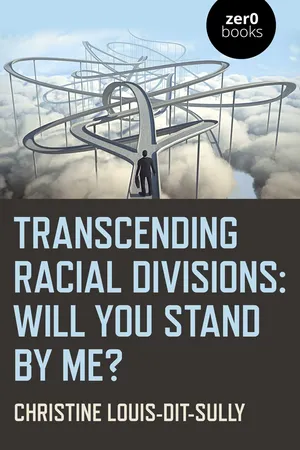
- English
- ePUB (mobile friendly)
- Available on iOS & Android
eBook - ePub
About this book
Martin Luther King, Jr once said, 'I have a dream that my four little children will one day live in a nation where they will not be judged by the color of their skin, but by the content of their character'. This is one of the aspirations many had when they fought against racism. They understood that for this aspiration to succeed everyone must participate in the project of completely transforming society to eradicate racial divisions and achieve equal treatment. Today, with the increasing demand to recognize the seemingly insurmountable gap between black people and white people, identity-based anti-racism has become more of a hindrance than a solution for a better and freer world for us all. The shift, from aspiring to transform social organization in order to transcend racial divisions to demanding recognition of racial divisions and identities and protection for minorities, represents the defeat of the universalist and radical politics of the past. Racial thinking, actively promoted by racists, has now become an acceptable tool for identity-based anti-racist activists in their demand for representation, diversity, inclusivity, segregation and safe spaces. Christine Louis-Dit-Sully examines the origins of racial thinking and the relationship between race and culture, she asks us to recognise that racial thinking is not the only way of understanding ourselves and the world around us.
Frequently asked questions
Yes, you can cancel anytime from the Subscription tab in your account settings on the Perlego website. Your subscription will stay active until the end of your current billing period. Learn how to cancel your subscription.
No, books cannot be downloaded as external files, such as PDFs, for use outside of Perlego. However, you can download books within the Perlego app for offline reading on mobile or tablet. Learn more here.
Perlego offers two plans: Essential and Complete
- Essential is ideal for learners and professionals who enjoy exploring a wide range of subjects. Access the Essential Library with 800,000+ trusted titles and best-sellers across business, personal growth, and the humanities. Includes unlimited reading time and Standard Read Aloud voice.
- Complete: Perfect for advanced learners and researchers needing full, unrestricted access. Unlock 1.4M+ books across hundreds of subjects, including academic and specialized titles. The Complete Plan also includes advanced features like Premium Read Aloud and Research Assistant.
We are an online textbook subscription service, where you can get access to an entire online library for less than the price of a single book per month. With over 1 million books across 1000+ topics, we’ve got you covered! Learn more here.
Look out for the read-aloud symbol on your next book to see if you can listen to it. The read-aloud tool reads text aloud for you, highlighting the text as it is being read. You can pause it, speed it up and slow it down. Learn more here.
Yes! You can use the Perlego app on both iOS or Android devices to read anytime, anywhere — even offline. Perfect for commutes or when you’re on the go.
Please note we cannot support devices running on iOS 13 and Android 7 or earlier. Learn more about using the app.
Please note we cannot support devices running on iOS 13 and Android 7 or earlier. Learn more about using the app.
Yes, you can access Transcending Racial Divisions by Christine Louis-Dit-Sully in PDF and/or ePUB format, as well as other popular books in Politics & International Relations & African American History. We have over one million books available in our catalogue for you to explore.
Information
Table of contents
- Acknowledgments
- Introduction
- Chapter 1 Race is a Product of History
- Chapter 2 Determinism and Fatalism in Race and Culture
- Chapter 3 Identity and Identity Politics
- Conclusion
- Endnotes